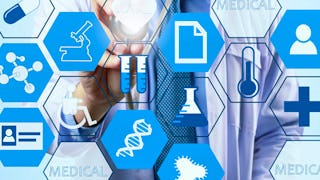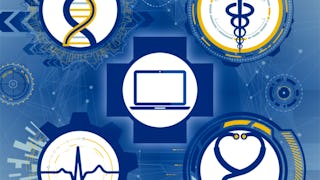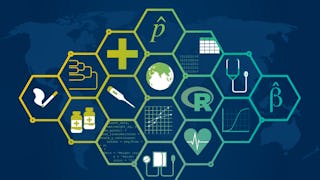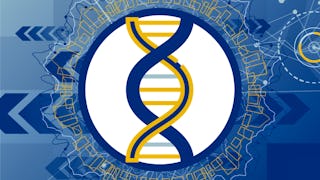Health data are notable for how many types there are, how complex they are, and how serious it is to get them straight. These data are used for treatment of the patient from whom they derive, but also for other uses. Examples of such secondary use of health data include population health (e.g., who requires more attention), research (e.g., which drug is more effective in practice), quality (e.g., is the institution meeting benchmarks), and translational research (e.g., are new technologies being applied appropriately). By the end of this course, students will recognize the different types of health and healthcare data, will articulate a coherent and complete question, will interpret queries designed for secondary use of EHR data, and will interpret the results of those queries.



The Data Science of Health Informatics
This course is part of Health Informatics Specialization


Instructors: Hadi H. K. Kharrazi, MD, Ph.D
20,789 already enrolled
Included with 
(211 reviews)
Recommended experience
What you'll learn
Articulate different forms of clinical and population level data.
Describe the data required to answer a healthcare information problem.
Distinguish between data questions and data queries when dealing with a healthcare information problem.
Skills you'll gain
Details to know

Add to your LinkedIn profile
4 assignments
See how employees at top companies are mastering in-demand skills

Build your subject-matter expertise
- Learn new concepts from industry experts
- Gain a foundational understanding of a subject or tool
- Develop job-relevant skills with hands-on projects
- Earn a shareable career certificate


Earn a career certificate
Add this credential to your LinkedIn profile, resume, or CV
Share it on social media and in your performance review

There are 4 modules in this course
In this module, we will begin by introducing and defining databases, and placing the role of databases within the context of clinical informatics. We will continue by introducing the common health data types such as demographics, diagnosis, medications, procedures, and utilization data. We will finish this module by reviewing the emerging health data such as lab orders/results, vital signs, social data, and patient-generated data.
What's included
6 videos1 assignment
In this module, we review the data specifications extracted from insurance claims and electronic health records. We will then discuss the common challenges in using health data, specifically issues with data quality, data interoperability, and data system architectures. Finally, we will describe the “Big Data” challenges of health data and explain some of the data problems that may hinder analytical efforts.
What's included
5 videos1 assignment
With this understanding of the data available, it’s time to see how to turn questions you and your colleagues will have into queries the database can understand. Besides getting rules of thumb for doing this translation, you will also be introduced to three online tools available to test some of these skills. You will also watch an interview with Sam Meiselman, course instructor and the data manager in charge of the Johns Hopkins Enterprise Data Warehouse, who has to use these skills on a daily basis.
What's included
6 videos1 assignment
To send home the recurring message on the challenges and art of translating questions into queries, you will see interviews with two professionals: One who comes from the data management side of the equation, and one who comes from the domain. They will give you perspectives that are both similar (the need to understand the problem for which the data are being retrieved) and different (the multiplicity of data available vs the richness of the domain problem).
What's included
8 videos1 assignment1 peer review
Instructors

Offered by
Recommended if you're interested in Health Informatics


University of California, Davis


Johns Hopkins University


University of Michigan


Johns Hopkins University
Why people choose Coursera for their career




Learner reviews
211 reviews
- 5 stars
71.56%
- 4 stars
21.32%
- 3 stars
2.84%
- 2 stars
0.94%
- 1 star
3.31%
Showing 3 of 211
Reviewed on Sep 7, 2022
this was exhirilating and intence..its worth going for...
Reviewed on Mar 16, 2022
The course content has rich of information and practical oriented. I felt more confidence after completetion of the course.
Reviewed on Dec 30, 2019
Really enjoy the real-world projects to utilize knowledge developed in the course!
New to Health Informatics? Start here.

Open new doors with Coursera Plus
Unlimited access to 10,000+ world-class courses, hands-on projects, and job-ready certificate programs - all included in your subscription
Advance your career with an online degree
Earn a degree from world-class universities - 100% online
Join over 3,400 global companies that choose Coursera for Business
Upskill your employees to excel in the digital economy
Frequently asked questions
Access to lectures and assignments depends on your type of enrollment. If you take a course in audit mode, you will be able to see most course materials for free. To access graded assignments and to earn a Certificate, you will need to purchase the Certificate experience, during or after your audit. If you don't see the audit option:
The course may not offer an audit option. You can try a Free Trial instead, or apply for Financial Aid.
The course may offer 'Full Course, No Certificate' instead. This option lets you see all course materials, submit required assessments, and get a final grade. This also means that you will not be able to purchase a Certificate experience.
When you enroll in the course, you get access to all of the courses in the Specialization, and you earn a certificate when you complete the work. Your electronic Certificate will be added to your Accomplishments page - from there, you can print your Certificate or add it to your LinkedIn profile. If you only want to read and view the course content, you can audit the course for free.
If you subscribed, you get a 7-day free trial during which you can cancel at no penalty. After that, we don’t give refunds, but you can cancel your subscription at any time. See our full refund policy.
More questions
Financial aid available,

